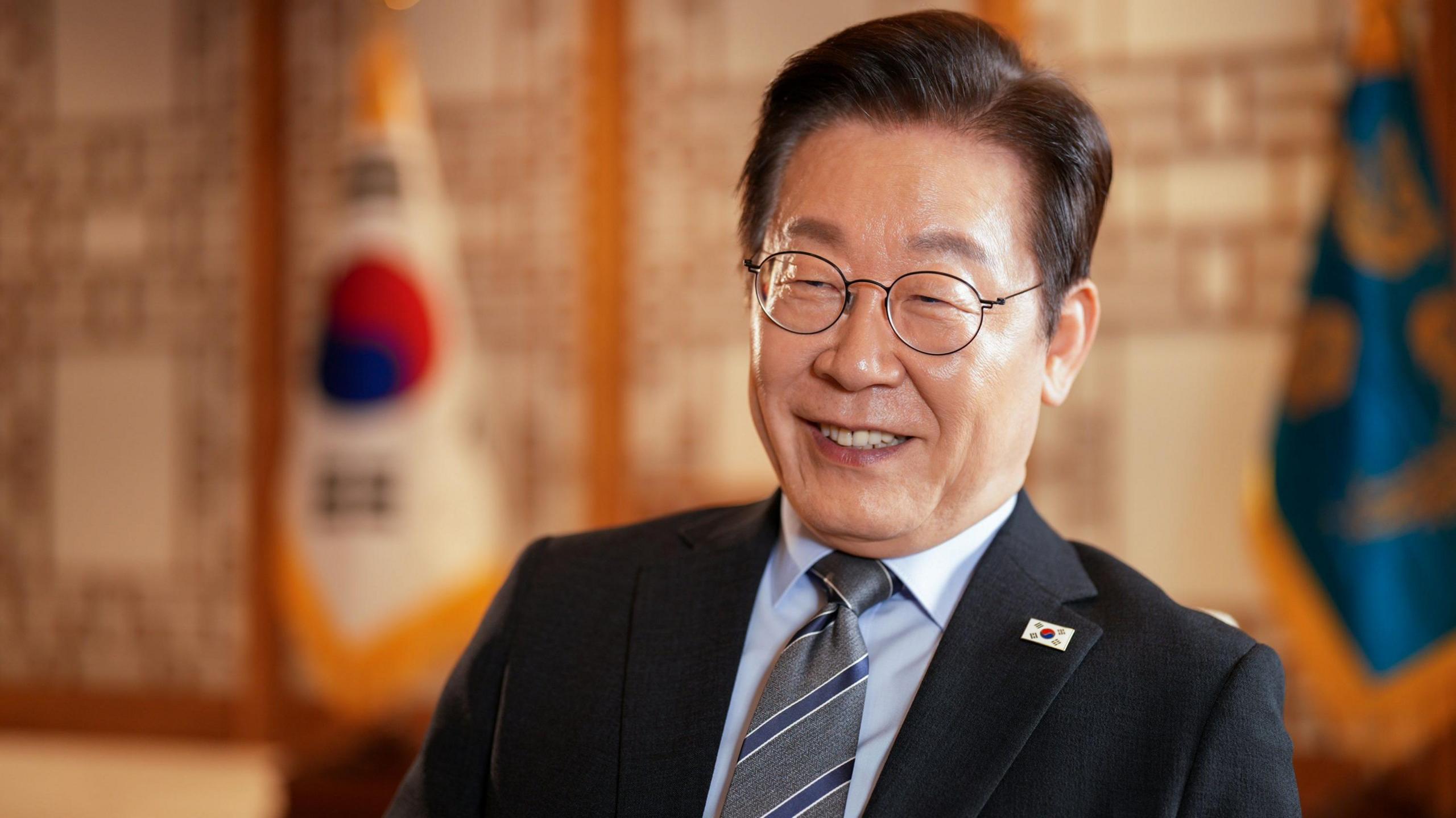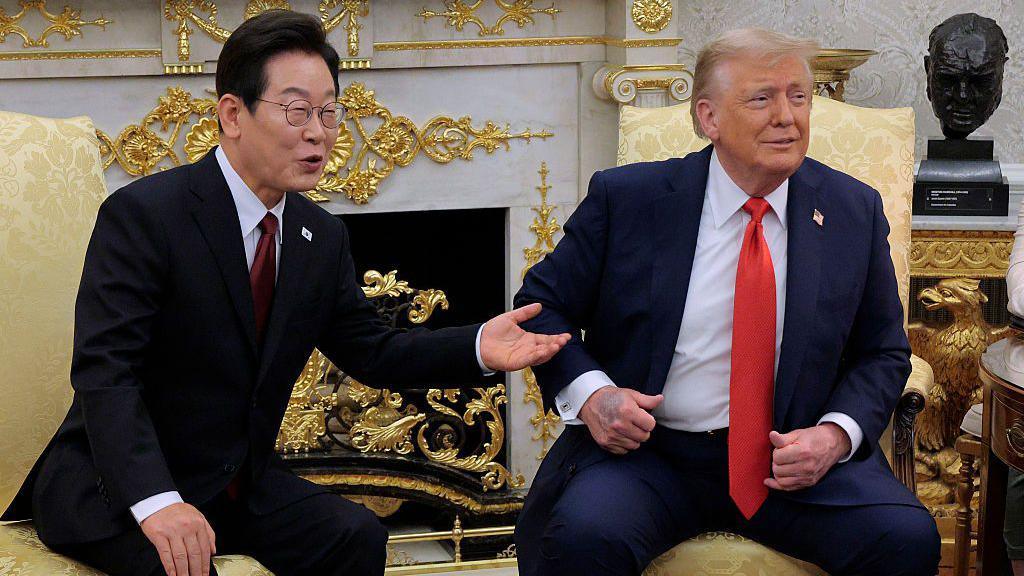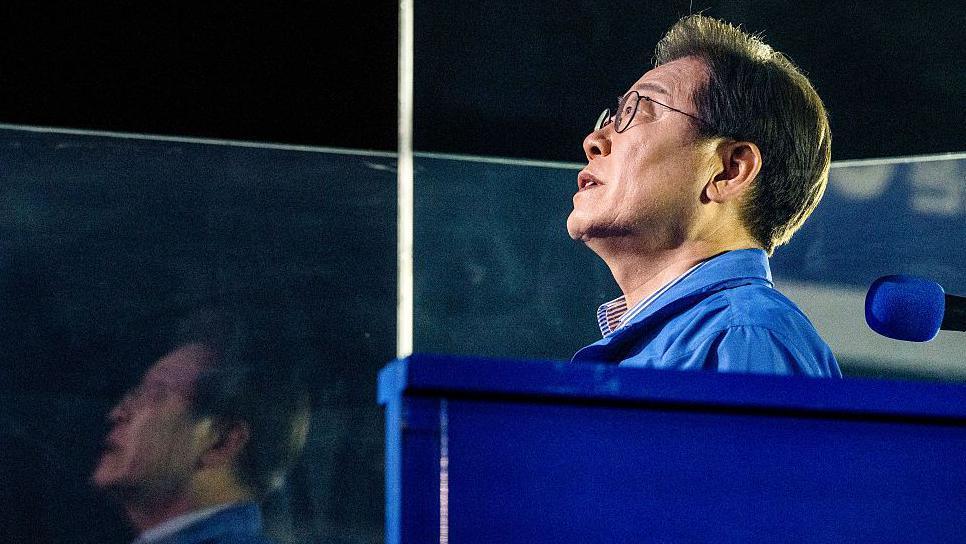South Korea would accept a Trump-Kim deal to freeze nuclear programme, president tells BBC
Watch: South Korean president tells BBC he would accept a Trump-Kim deal to freeze NK's nuclear programme
- Published
South Korea's president has said he would agree to a deal between Donald Trump and Kim Jong Un in which North Korea agreed to freeze production of its nuclear weapons, rather than get rid of them.
Lee Jae Myung told the BBC North Korea was producing an additional 15-20 nuclear weapons a year and that a freeze - as "an interim emergency measure" - would be "a feasible, realistic alternative" to denuclearisation for now.
North Korea declared itself a nuclear power in 2022 and vowed to never relinquish its weapons.
"So long as we do not give up on the long-term goal of denuclearisation, I believe there are clear benefits to having North Korea stop its nuclear and missile development," Lee Jae Myung said.
"The question is whether we persist with fruitless attempts towards the ultimate goal [of denuclearisation] or we set more realistic goals and achieve some of them," Lee added.
President Lee, who entered office in June, wants to establish peaceful relations with North Korea and reduce tensions, which flared under his predecessor Yoon Suk Yeol, who was impeached for trying to impose martial law last year.
The South Korean leader has been vocal about wanting President Trump to resume nuclear talks with Kim, which broke down in 2019 during Trump's first term, after the US asked the North to dismantle its nuclear facilities.
In a speech to parliament on Sunday, the North Korean leader suggested he would be willing to negotiate with Trump – but only if the US dropped its demand for the North to denuclearise.
Lee told the BBC that he thought it possible that Trump and Kim could come back together, given they "seem to have a degree of mutual trust". This could benefit South Korea and contribute to global peace and security, he added.

Lee has been vocal about wanting President Trump to restart talks with North Korea's Kim
The BBC sat down with the South Korean president at his office in Seoul, ahead of his trip to the United Nations General Assembly in New York on Monday.
South Korea currently holds the presidency of the UN Security Council, but Lee would not be drawn on whether the body was failing South Korea, because for years both China and Russia have blocked attempts to impose further sanction the North over its nuclear programme.
"While it's clear the UN is falling short when it comes to creating a truly peaceful world, I still believe it is performing many important functions," Lee said, adding that reforming the Security Council was "not very realistic".
Asked whether China was now enabling North Korea's nuclear weapons programme, Lee said it was "impossible to know", but based on his current knowledge this was not his understanding.
Earlier this month Chinese President Xi Jinping welcomed Kim at a military parade in Beijing alongside Russia's Vladimir Putin and, unlike in past meetings, China did not publicly mention the North's nuclear weapons or denuclearisation.
The burgeoning ties between Beijing, Moscow and Pyongyang, on show at China's parade, put South Korea in "a very difficult situation", Lee said.
"Seeing China, Russia and North Korea become so close is clearly not desirable for us," he said, adding that he would likely respond by continuing to work closely with the US and Japan.
Watch: Xi, Putin, Kim and other world leaders pose for a photo at China's military parade
Historically, South Korea has balanced its relationships between the US - its military ally - and China - which it relies on for much of its trade - but this tightrope is becoming trickier to walk.
Recently Lee said he would stand with the US in the new world order that is emerging, but speaking to him, it is clear he wants to avoid making enemies in the process.
This once left-leaning, hardline opposition leader now presents himself as a centrist. He chooses his words and positions carefully, as he tries to deftly navigate South Korea's place in a shifting world.
"The world is dividing into two camps, and South Korea is positioned right on the border," he said, noting his country's "truly precarious location" next to China and Russia.
"This situation is become increasingly difficult. But these camps cannot completely shut their doors, so we can position ourselves somewhere in the middle."
Lee was even careful not to discard a future relationship with Russia, which has forged a military partnership with North Korea during the Ukraine war - sending it food, oil and vast sums of money in return for weapons and troops.
"It is clear that Russia's invasion of Ukraine should be condemned, and that the war must end as soon as possible," he said.
"But relations between countries are not straightforward, and we find ways to co-operate wherever possible and strive to co-exist peacefully."
Read more of our coverage
Firms will hesitate to invest in US after raid - S Korea president
- Published11 September
South Korea's charm offensive and other takeaways from Trump meeting
- Published26 August

Presidents Lee and Trump met at the White House in late August
His caution is understandable. The perils of relying too heavily on the US have never been more apparent, with both America's friends and foes caught up in Trump's ongoing trade war.
Lee successfully managed to reduce tariffs on South Korea down to 15%, and during a recent trip to the White House he appeared to charm the president. But since then, trade talks have stalled, with the two sides unable to agree on the terms of a deal.
Then, a fortnight ago, US immigration officials detained hundreds of Korean workers who were building a car battery factory in Georgia – part of South Korea's commitment to move manufacturing to the US, while also investing hundreds of billions of dollars there. Lee's government managed to secure the workers' release a week later.
"As president, I feel a profound sense of responsibility for the harsh treatment our citizens endured," he said, describing the incident as "shocking". Korean companies would now likely be "more hesitant to invest in the US", he added.
But Lee said he believed he could use the incident to strengthen Seoul's relationship with Washington.
"There's a Korean proverb that says, 'after the rain, the ground hardens'."

Lee won a decisive mandate in June, six months after his predecessor's failed martial law bid
At home, Lee is presiding over a polarised country, shaken by months of political turmoil, after its previous president tried to orchestrate a military takeover. Yoon, who is now facing life in prison, stoked tensions with North Korea.
He tried to justify his failed attempt at martial law by claiming the country's institutions had been infiltrated by supporters of Pyongyang.
Now, Lee says he is trying to do what he can to repair trust with the North. After entering office, he stopped the government in Seoul from transmitting radio broadcasts into North Korea.
These broadcasts were known to anger Kim Jong Un, but were one of the few ways that North Korean people, who are increasingly isolated, could receive information from outside the country. The move was criticised by human rights organisations.
"We judge that [these broadcasts] have almost no practical effect," Lee said when asked to justify his decision. He argued that any benefits were not enough to outweigh the cost of antagonising the regime.
"What matters is restoring trust between the North and South, especially since the last government's stance toward North Korea was so hostile. We think these measures will help get North Korea to return to talks."
The North has so far rejected Lee's goodwill gestures, calling him "delusional" and a "daydreamer".
But Lee is not naïve. He knows Donald Trump is his most likely path to peace on the peninsula, and that this path must be redrawn.
Eager to portray himself as a pragmatist, he understands, unlike others before him, that North Korea's nuclear weapons cannot be negotiated out of existence – at least not for the time being.